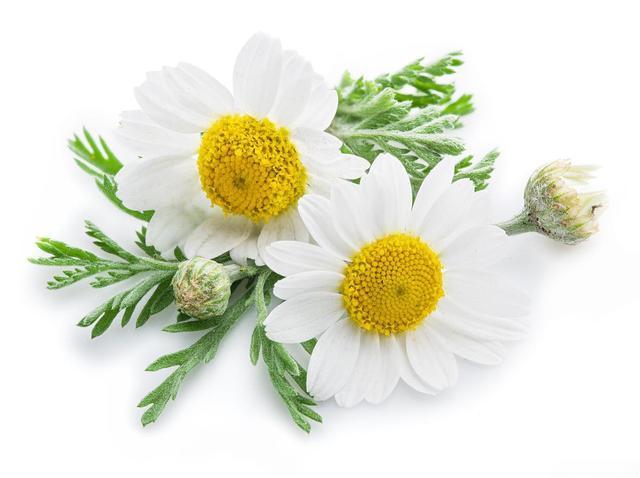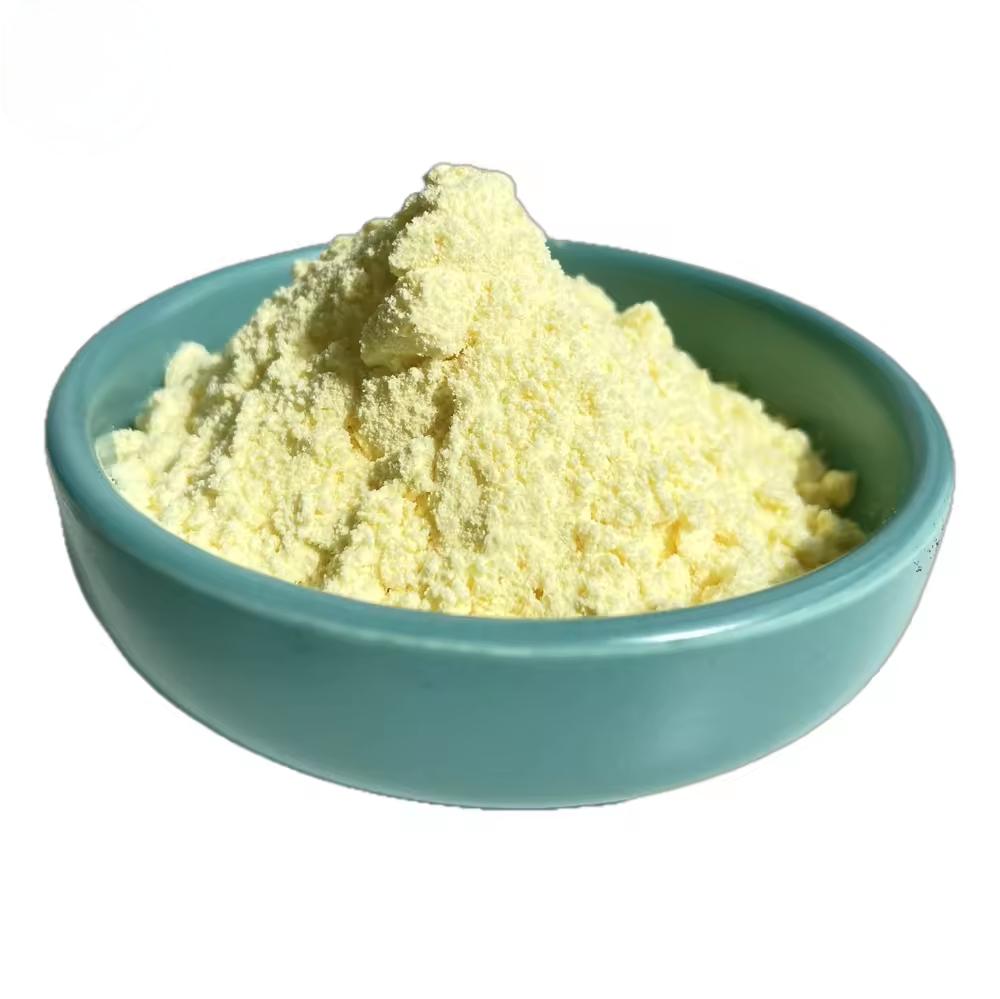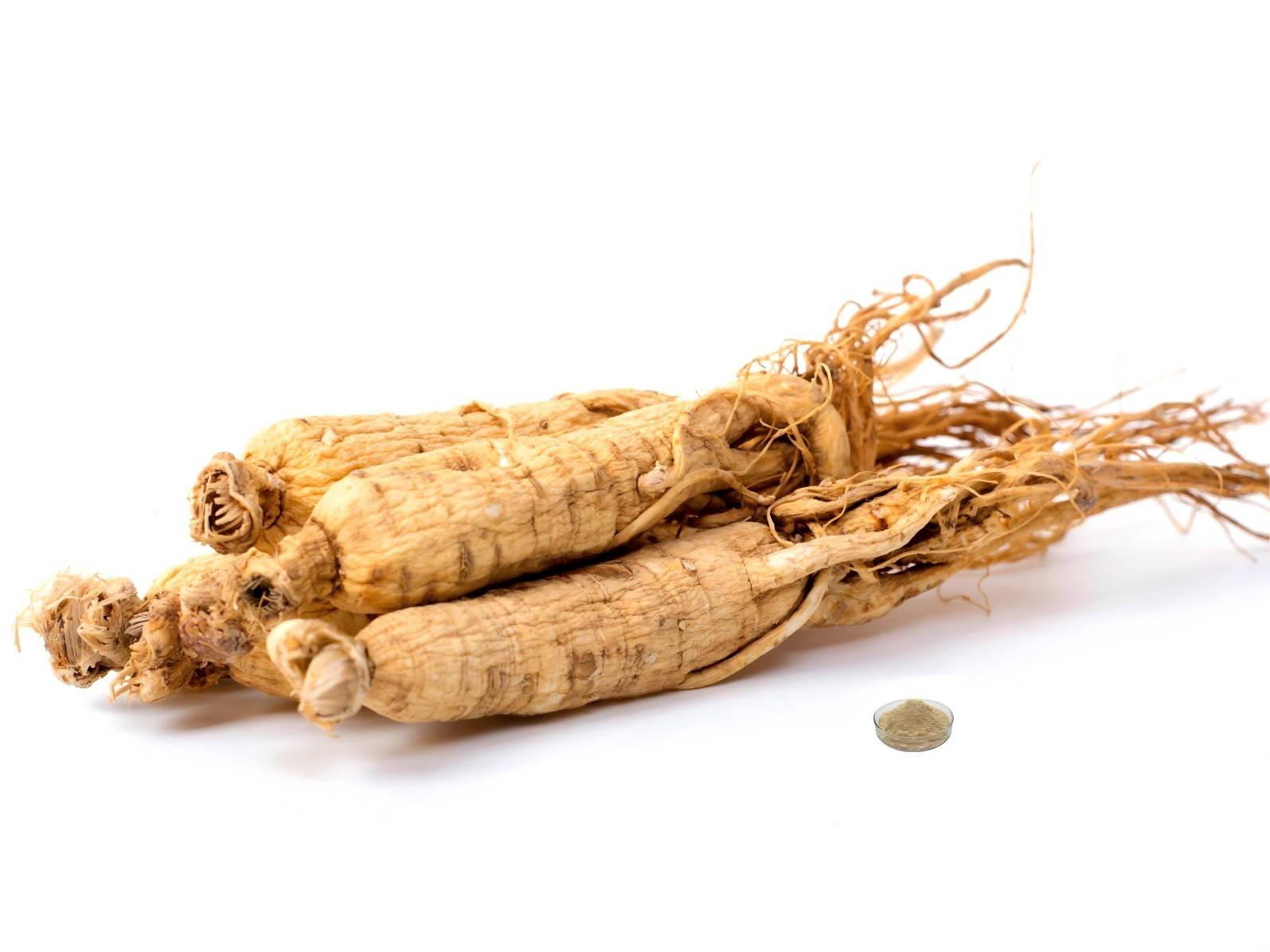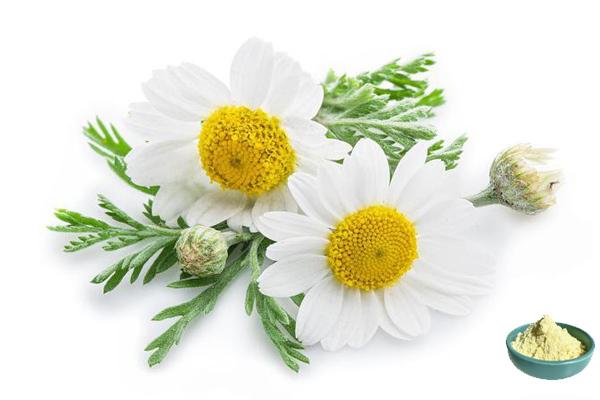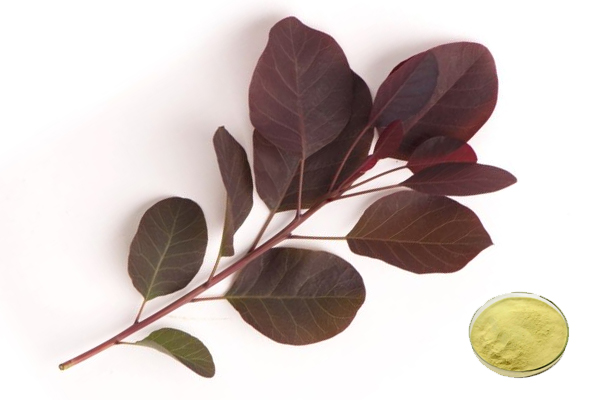Apigenin Powder 98%
Latin Name:Matricaria chamomilla L.
Source:Chamomile Flower
Specification:98%
Testing Method:HPLC
Appearance:Light Yellow Powder
Pesticide Residue:Comply with (EC) No 396/2005 Standard
- Description
- Data Sheet
- Certificate
-
What is Apigenin Powder 98%?
Apigenin is a flavonoid found widely in a variety of plants such as parsley, celery, onion, chamomile, thyme, oregano, basil, tea, beer, wine, grapefruit and orange. It has a characteristic 15-carbon atom flavonoid backbone containing multiple ring structures, ketone groups, and multiple hydroxyl groups, which endow apigenin with rich electronic properties and diverse binding affinities.
Studies at home and abroad have found that apigenin has a variety of biological activities such as antitumour, antioxidant, anti-inflammatory and hypoglycaemic, etc. As a natural active substance with a potential for a wide range of applications, it has a great potential for development in the fields of food, nutraceuticals and pharmaceuticals.
Apigenin Powder is a light yellow fine powder extracted from celery or chamomile by the supercritical CO2 method. The supercritical CO2 extraction temperature is low (about 35℃), which can effectively protect the heat-sensitive components of apigenin from destruction. The whole process does not require organic solvents and does not produce substances harmful to the human body and environment. High extraction efficiency, low energy consumption, safe and stable extraction process, and non-toxic, colorless, and tasteless.
Green Spring Technology supplies Apigenin Powder 98%, which is extracted from Chamomile flowers, with high purity, stable properties, and low moisture content, and can be stored for a longer period. It complies with EU EC396, EU 2023/915 standards, and the highest solvent residue standards.
Green Spring Technology is a leading plant extract technology company in China with 24 years of experience in plant extracts. It has 7 certifications and 7 patents. It has established a perfect traceability system for all its products. Green Spring has obtained Halal, Kosher, COSMOS, BRC, IFS, FDA, ISO, and many other certifications. Authoritative third-party test reports are available.
Specification:
Product Name
Apigenin
Latin Name
Matricaria chamomilla L.
Source
Chamomile Flower
Specification
98%
Testing Method
HPLC
Appearance
Light Yellow Powder
Pesticide Residue
Comply with (EC) No 396/2005 Standard
Regulation:
It conforms to EU regulations.
Looking for a Quotation?Benefits:
Helps with Sleep
Studies have shown that apigenin has a positive effect on sleep. In animal models, apigenin reduces motor activity and increases sedation, which may contribute to shorter sleep latency and improved sleep quality. Additionally, apigenin can promote sleep by reducing the stress response and increasing levels of BDNF (Brain Derived Neurotrophic Factor) and serotonin.
Anti-Aging
Apigenin exerts its anti-aging effects through a variety of mechanisms. In animal models, apigenin extends the lifespan of fruit flies and nematodes, and in mice, it improves learning memory, reduces tumour proliferation and prolongs survival. The anti-aging mechanisms of apigenin may include reduction of oxidative stress, modulation of immune responses, protection of neurovascular coupling, enhancement of mitochondrial function, and improvement of metabolic health.
Anti-tumour
Studies have shown that apigenin activates transcription factor 3 thereby inhibiting Id1 expression and reducing the proliferation and tumourigenesis of ovarian cancer A2780 cells. Epithelial mesenchymal transition (EMT) is a very important mechanism for initiating and promoting tumour metastasis. Apigenin was found to inhibit metastasis, invasion, and colony formation of non-small cell lung cancer cells with different states of epidermal growth factor receptor by suppressing Snail/Slug-mediated epithelial mesenchymal transition.
Lowering Blood Sugar
Studies have shown that apigenin repairs cellular damage induced by streptozotocin (STZ) in pancreatic β-cells, prevents lipid peroxidation and protein carbonylation, reduces cellular DNA damage, and significantly reduces reactive oxygen species (ROS) production in rat insulinoma cell lines. Apigenin and naringenin effectively restored high glucose-reduced Bcl-2 expression and Akt phosphorylation and protected endothelial cells from damage by inhibiting phosphorylated expression of protein kinase CβII (PKCβII) and downstream reactive oxygen species (ROS) production in high glucose-exposed endothelial cells. In conclusion, apigenin and naringenin may ameliorate endothelial dysfunction by modulating ROS/caspase-3 and NO pathways.
Antioxidant
Numerous scientific studies have revealed the good antioxidant activity of apigenin. One study found the ameliorative effect of apigenin as a natural antioxidant on MTX (methotrexate) hepatotoxicity. Liver antioxidant indexes were significantly elevated in the apigenin pretreatment group, whereas serum AST, ALT, and ALP levels were markedly reduced, and hepatic MDA (Malondialdehyde), TNF-α (Tumour Necrosis Factor α), NO, and IL-1β (Interleukin 1β) levels were significantly reduced. In addition, the hepatoprotective effect of apigenin was confirmed by histological evaluation of the liver, and apigenin could prevent MTX-induced hepatotoxicity by reducing oxidative stress and inflammation.
Vasodilator
After removing the vascular endothelium, it was found that apigenin still had a vasodilatory effect but it was weakened, suggesting that its target point of action included vascular endothelial cells in addition to vascular smooth muscle cells. Preliminary mechanistic studies showed that the vasoconstrictive effect of apigenin against phenylephrine was not only related to the impediment of Ca2+ influx through the modulation of Ca2+ channels but also to the release of NO and the increase in cGMP levels. cGMP levels.
Applications:
In Cosmetics:
Apigenin's absorption of ultraviolet rays is concentrated in the B region (wavelength between 280~320nm), which is strong absorption and can be used in sunscreen series cosmetics. In the A area (wavelength between 320~400nm) the absorption is small, so the low concentration of apigenin can be used as a skin tanning agent to join the use of tanning oil. Apigenin powder can be used in creams; it can be compounded with vitamin B1, vitamin B6, vitamin B12, vitamin C, etc.; it can also be compounded with essential oils such as chamomile oil, calendula oil, and almond oil. High concentrations of apigenin can inhibit melanin cell activity, can be added to sunscreen, cream, essence, lotion, mask, and other cosmetics; and can be used in shampoo, and conditioner.
Apigenin has a strong absorption capacity for UVB ultraviolet rays can protect against radiation damage, and can be used in sunscreen cosmetics. Apigenin has strong antioxidant properties and a strong capturing ability for various oxygen-containing free radicals, which can prevent oxidative degradation of oils and fats. Apigenin also has anti-inflammatory activity, preventing skin problems such as blister evidence, keratosis pilaris, and hyperkeratosis. In addition, apigenin relieves itchy scalp and can be used in hair care products. Therefore, apigenin powder is increasingly used in various kinds of efficacious cosmetics.
-
Download
Apigenin Powder 98% COA


 English
English French
French Spanish
Spanish Russian
Russian Korean
Korean Japanese
Japanese



